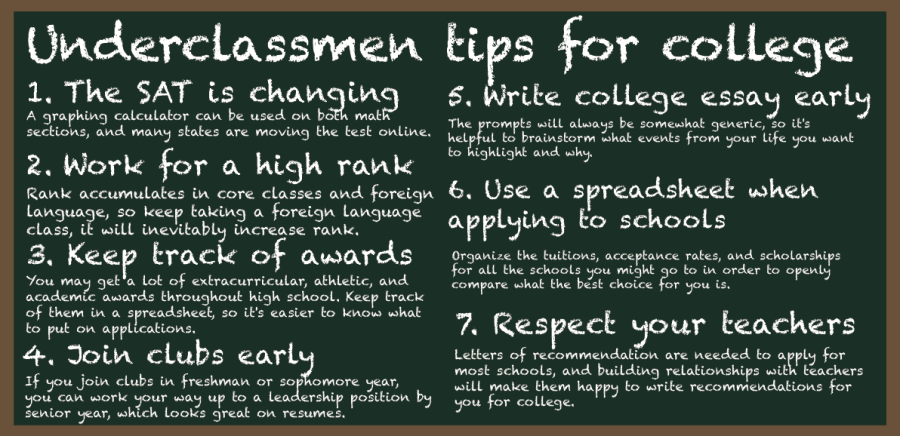Underclassmen tips for college
According to the College Board, which helps students prepare for AP classes and exams, SATs, and other preparations for college applications, using underclassmen years of high school to take rigorous courses and set up resumes is crucial to college success.
April 29, 2022
Between, academics, extracurriculars, and sports, college applications require early preparation
Senior Katherine Crosley blankly stared at her screen.
Essays, GPAs and rank, letters of recommendation from teachers, and why is there a counselor recommendation?
In this moment of being overwhelmed, Crosley reminisced on her freshman and sophomore years, wondering why she wasn’t aware of any of this information sooner.
“When beginning to apply for college, I was very confused on what supplements I needed to apply, deadlines, and how I should even pick the schools I want to go to,” Crosley said. “Since I didn’t have a college counselor to help me, I was pretty much on my own, and I felt like I didn’t know anything.”
According to the College Board, which helps students prepare for AP classes and exams, SATs, and other preparations for college applications, using underclassmen years of high school to take rigorous courses and set up resumes is crucial to college success.
“College admission requirements are typically more stringent than high school graduation requirements,” the College Board stated on a ‘preparing students for college’ help page.
Between balancing academics and sports, as well as joining clubs, there are many things to think about when trying to tackle high school and prepare for college, according to senior Mario Rincon, who has already committed to Texas A&M University to study engineering.
“I didn’t really prepare for applying to college and I wish I would’ve had someone help me and advise me on what things I should request and find early,” Rincon said. “It would’ve been easier to not panic trying to get all the things necessary for applying to the college I want.”
When entering high school, most teachers will preach that good academics are the most important factor to consider when wanting to be admitted to prestigious colleges, according to Collegiate Gateway. Even if other factors are taken into account for a holistic application review, an article on their website implies that academics are still the most important factor and should be taken seriously.
“Your grades throughout high school remain the most important factor in college admissions,” president of Collegiate Gateway Julie Raynor Gross said in the article. “81% of colleges surveyed by the National Association of College Admissions Counselors (NACAC) give considerable importance to both grades in college prep courses and grades in all your courses.”
Bowie alumni and author Matt Worthington used his book, Ultra Productive: Graduating Debt-Free and Getting Ahead, to inform students on the importance of focusing on grades in high school to help their future financially in college and beyond.
“While I don’t think I would have gone anywhere other than ACC due to financial reasons, I do realize the importance of education as I get older,” Worthington said. “Knowledge is power and if I could’ve done things differently, I would have focused more on learning in high school and less on going out every weekend.”
In addition to high school grades, the SAT standardized test has been a requirement to take for admission to colleges since 1926. However, due to the pandemic, the SAT has implemented several changes to their testing and may even make the test optional in the future. The test is moving online for easier accessibility and a graphing calculator will be able to be used on all portions of the test, according to the Education section in US News. When applying to college, Rincon believes these adjustments could make it easier to get a better score on the SAT, and therefore help with admission.
“Even with the changes making it easier, I definitely would still recommend taking the SAT,” Rincon said. “I used the More Than a Teacher course to help me prepare, and I recommend it to others because it certainly improved my score.”
Another factor that is needed to submit for college applications is class rank. Although every schools’ requirements are different, for Bowie, the only classes that go into decisions for class rank are core classes and foreign language, if taking one. Crosley believes her rank has improved based on the fact that she continued to take a foreign language past the graduation requirement.
“I’m so glad I took Spanish up until my junior year because I feel like it definitely helped my rank be higher,” Crosley said. “I definitely think underclassmen should know the importance of continuing a foreign language if class rank is something they’re passionate about doing well in.”
Although the Collegiate Gateway and College Board argued for the importance of grades and academics for college admissions, the American Heritage School also argues in an article on their website how crucial participating in extracurricular activities are for allowing colleges to have a holistic review of student applications.
“Extracurricular activities are one way to show unique skills and interests,” the American Heritage School staff said in the article. “It is how you can stand out in a sea of excellent academic students; colleges want to know that their choice is a well-rounded student who can learn from a variety of activities beyond what is learned from lessons.”
For Crosley, participating in in-school and club volleyball throughout her life led her to land a commitment to Tulane University to continue playing. She believes that her ability to excel in academics while playing volleyball allowed the college to see her commitment to both school and sports, as well as her time management with balancing both.
“I am so glad that I have participated in sports throughout my school career, because not only do I love it, but it also landed me at my dream college,” Crosley said. “I strongly encourage students to get involved in a sport or program they love because not only is it great for applications, it also could possibly help you figure out what you want to do in life, and that’s what it did for me because now I have a college plan.”
Besides sports, in-school clubs are another way for colleges to have insight into students’ personality and what they’d bring to their university.
“I did join clubs to help my resume and I recommend you do that so that you can get leadership roles in those clubs, which looks awesome on college applications,” Rincon said. “I definitely think you should start joining them early, so it’s easier to work your way up to a leadership position, which will be what makes you stand out from other applicants.”
Writing a college essay is needed for most applications, especially for more prestigious schools, and the prompts may vary for certain schools, but are usually generic. According to Rincon, starting the essay early is crucial to tackling it.
“I figured out what I wanted to write for my college essay based off of the prompt, which was pretty broad, and what experiences I can use to persuade the college I’m applying to that I’m a person that stands out from the rest,” Rincon said.
Another factor that should be taken into account is the cost of attending certain universities. According to an article by Federal Student Aid, tackling college costs can be a large feat. In Worthington’s book, he centers around how to graduate college with the least amount of debt as possible, hopefully avoiding it altogether.
“Don’t let your ego get in the way of making a smart financial decision; going to community college and living at home will be much better from a financial standpoint as you look at your bank account later in life,” Worthington said. “It’s not where you go that matters, it’s how you capitalize on opportunities where you go that matters more.”
In addition to researching financial options for college, for Crosley, it was helpful when applying to make a Google spreadsheet of all the colleges she was applying to and comparing their tuition, acceptance rates, and overall cost to go there.
“It was something that was really helpful for me to do because actually visualizing how expensive each school would be for me, even after my volleyball scholarship, was really good for my parents and I,” Crosley said. “Comparing tuitions and acceptance rates gave me a better idea of which schools were my target and reach ones.”
As an underclassman, creating a balance between grades and extracurricular activities, while keeping applying for college in mind as one goes through high school will set up a great path to being prepared for college, according to Rincon.
“Acceptance isn’t always guaranteed no matter what you have on your application,” Rincon said. “If you make sure you put your best foot forward with preparation, there’s not much to worry about, you will most likely get in, and any school will be lucky to have you.”









